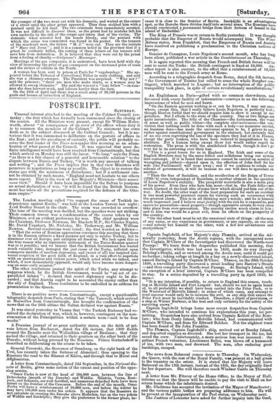An Englishman in Paris—gifted with no common shrewdness, and favoured
with every facility of information—conveys to us the following impressions of what he sees and hears.
"On the Eastern question nothing is or can be known, I may say any- where, except this, that I really believe Louis Napoleon is perfectly firm ; though Heaven forbid that we should require him to show it except in ne- gotiation. But I allude to the state of the country. One or two things are quite incontestable. The folly of the Chamber—the factiousness, the want of sense as well as public virtue—the complete obstructiveness—the con- viction that nothing could be done with such a body—no measures carried, no business done—has made the universal opinion to be, I grieve to say, rather against constitutional government in the abstract, but certainly that of no one even regretting the loss of the specimen they had of it in France, except the party leaders, who have been reduced to insignificance by its abolition. Not a human being except these but would rather regret its restoration. The press is with the annihilated leaders, though it don't go very far in its sorrowing over their loss.
"This is a great lesson for us in England. The Irish and some of the English Members may by the same follies and selfishness bring our system i
into contempt. If it s found that measures cannot be carried on account of wrangling and jobbery—depend upon it, the affection of John Bull for his wife (the Parliament) will wear away ; and if we continue to retain our scheme of government, it will be because no one will dare to speculate on another.
"Then the fear of Socialism, and the recollection of the Reign of Terror (1793-'4) even independent of Socialism, is another element in the question of Louis Napoleon's stability. The prosperite materielle is also a main prop of his power. Even they who hate him most—that is, the Paris folks—are much alarmed at the least idea of some blow which should put him out of the way. No doubt, the utter want of the least preparation for such an accident is one most powerful practical reason for viewing such an occurrence with the greatest alarm. This is in all thinking men's minds ; and he is himself much impressed (and I believe most justly) with the risk he is exposed to, and spares no precaution—most properly—though oppressive arrests do very often take place from over-precaution. The scarcity excites much alarm in him ; and to him war would be a great evil, from its effects on the prosperity of the country. "On the other hand must be set the unnatural state of things : all the men of any name, or any experience in government, or any capacity, on one side —and nobody but himself on the other, with a few low adventurers and stockjobbers."


























 Previous page
Previous page